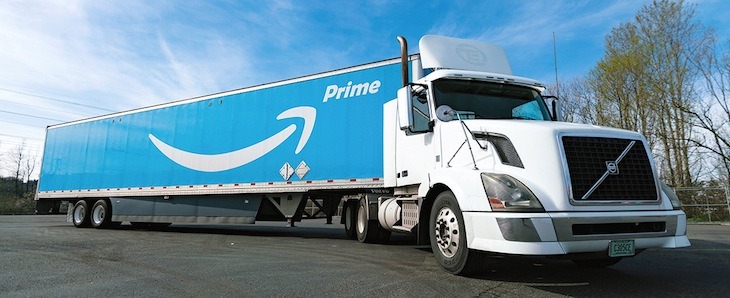Amazon opens online truck brokerage, expected to put pressure on existing brokers
by April 30, 2019 3:02 pm 3,894 views

Amazon recently announced the launch of a truck brokerage segment, and the move is expected to put pressure on margins of existing freight brokers as the online retailer shifts to free one-day shipping for its Prime members, analysts said.
In a recent industry update, senior research analyst Benjamin Hartford and research analyst Andrew Reed, both of Baird, said rumors of Amazon establishing a truck brokerage moved forward with the launch of its website, freight.amazon.com. The move follows the development of the Relay app in late 2017 and speculation that Amazon was developing a U.S. truck brokerage.
“In sum, Amazon’s launch of Full Truckload Services is a net-negative for investor sentiment on incumbent domestic U.S. truck brokers and adds to what we expect to be gradual erosion in industry gross margins over time,” according to Hartford and Reed. “Though its strategy with its Full Truckload Services effort is unclear, we suspect its effort to scale — along with similar efforts from recent industry startups, including Uber Freight, KeepTruckin and others — its carrier fleet will pressure per-unit gross margins received by traditional freight brokers, particularly on loads that are more commoditized and/or subject to automation.”
But the analysts noted this doesn’t mean that existing brokers will be eliminated from the supply chain, and that the potential remains to gain market share with the development of technology platforms for large public brokers and carriers developing brokerages. However, the arrival of Amazon to the market is expected to increase the compression of gross margins, especially as the volatility in the industry subsides from 2017-2018 levels.
In a separate industry note, Hartford and Reed said Lowell-based carrier J.B. Hunt Transport Services has experienced an “aggressive bid season” in 2019 within the carrier’s brokerage segment, and this would reflect more balanced supply and demand and softer spot volume activity and increased competition.
Existing truck brokers have not been performing as well as asset-based carriers, and questions remain regarding the impact on supply with the addition of new technology to the industry, such as J.B. Hunt’s freight matching software Marketplace, which is part of the carrier’s technology platform J.B. Hunt 360. “Will new, more efficient load matching capabilities slow the rate of capacity exits this cycle?” said Hartford and Reed, adding asset-based carriers with emerging logistics capabilities are “strategically better positioned to weather the risk of gross margin compression than incumbent non-asset-based brokers.”
Amazon’s digital freight brokerage platform at freight.amazon.com was undercutting market prices from 26% to 33%, and its announcement to offer free one-day shipping for Prime members is expected to increase consumer expectations and the cost to compete in e-commerce, according to a recent FreightWaves article. Part of the online retailer’s move into truck brokerage might be to limit the price volatility in the trucking industry as Amazon spends about $28 billion annually on shipping costs, the article shows.
In an industry update on Amazon’s move to one-day free shipping for Prime members, Hartford and Reed said Amazon expects to invest $800 million in the second quarter as next-day shipping is more expensive. Since Amazon started to offer free two-day shipping for Prime members in 2005, parcel carrier UPS’ margins related to earnings before interest and taxes have declined from 15.7% to 8.9%. Amazon has been developing its own logistics capabilities since the early 2000s, and this has led some investors to believe the insourcing has negatively impacted margins for UPS and FedEx.
“We think the impact has been less direct but nonetheless still very consequential,” according to Hartford and Reed. “Amazon’s creation of customer demand and expectations for (business to consumer) led to e-commerce’s rapid development over the past 10-15 years. As a result, we recognize the risk a similar headwind being presented to parcel providers if the migration to free one-day becomes adopted and expected in customer preferences.”
A timeline on when this service will be available across North America is expected to be provided at a later date, but Amazon plans to accelerate many Prime deliveries immediately, as it has “turned the dial up significantly in April,” according to an industry note by analyst Jack Atkins and senior associate Andrew Hall, both of Little Rock-based Stephens Inc.
